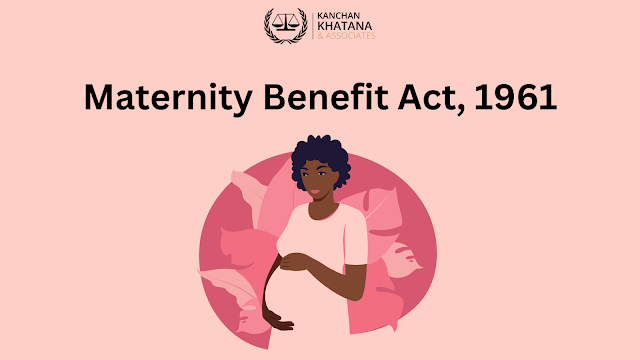The Maternity Benefit Act, 1961:
The Maternity Benefits Act, 1961 and The Maternity Benefit (Amendment) Act, 2017: aim to regulate women's employment all over the country. The act provides 12 weeks as the maximum period for which any working woman shall be entitled to maternity benefits. She can avail of this benefit for 6 weeks up to and including the day of her delivery and 6 weeks immediately following the day of her delivery. (Section 4)
Applicability of the Act
The Act applies to:
• Every factory, mine or plantation (including those belonging to Government),
• An establishment engaged in the exhibition of equestrian, acrobatic and other performances, irrespective of the number of employees, and
• Every shop or establishment wherein 10 or more persons are employed or were employed on any day of the preceding 12 months.
Eligibility & Conditions for Claiming Benefits
The Act stipulates down that any working women, whether directly or through any agency, for wages in any establishment are eligible to claim maternity benefits if she is expecting a child and has worked for her employer for at least 80 days in the 12 months immediately preceding the date of her expected delivery. (Section 5). A woman looking forward to maternity benefits could ask the employer to give her light work for a month. Such a request should be made at least 10 weeks before the date of her expected delivery. At that time she needs to produce a certificate confirming her pregnancy. (Section 5). Also, she needs to give a written notice to the employer about 7 weeks before her delivery date regarding her absence period pre and post-delivery. (Section 5).
Cash Benefits
• Leave with average pay for 6 weeks before and 6 weeks after the delivery.
• Medical bonus of at least Rs. 1000 extending to Rs. 20000 if the employer is unable to provide free medical care to the women employee. (Section 8) (Amended on 15-04-2008)[2]
• Additional leave with pay for up to 1 month on the production of proof, revealing illness due to pregnancy, delivery, miscarriage, or premature birth. (Section 10)
• In case of miscarriage, 6 weeks leave with average pay from the date of miscarriage. (Section 9)
Non-Cash Benefits/Privilege
• Light work for 10 weeks before the date of expected pregnancy if she asks for it.
• Two nursing breaks in the course of her daily work until the child attain age of 15 months. (Section 11)
• In case of tubectomy operation leave with wages for 2 weeks. (Section 9A)
• No discharge or dismissal while being on maternity leave. (Section 12)
• No change to her disadvantage in any of the conditions of her employment while on maternity leave. (Section 12)
• Pregnant women discharged or dismissed may still claim maternity benefits from the employer. (Section 12)Women employee who is dismissed on grounds of gross misconduct loses her rights under the Act for Maternity Benefit.
Miscarriage and Tubectomy Operations Leave with wages at the rate of maternity benefit, for a period of 6 weeks for miscarriage and 2 weeks for tubectomy operation. (Sections 9 & 13)
Illness Arising Out of Pregnancy A woman suffering from illness on account of miscarriage, medical termination of pregnancy, delivery, or premature birth is entitled to further leave for 1 month in addition to the leave with wages at the rate of maternity benefit. (Section 10)
Prohibition on Employment during Certain Periods The Act prohibits an employer from knowingly employing a woman or any woman from working, 6 weeks immediately following the day of her delivery or miscarriage. (Section 4)
Discharge from Employment The Act prohibits dismissal or discharge or variation in conditions of service to the disadvantage of any pregnant woman, while she is absent due to reason under the Act. (Section 12)She can claim maternity benefits or medical bonuses, even if discharged or dismissed during pregnancy. This shall not be applicable in case of dismissal for gross misconduct. (Section 12)
Benefits in Case of Death of a Pregnant Employee In such case, the maternity benefit shall be paid only for the days up to and including the day of death. (Section 7). The employer should pay such benefit or amount to the person nominated by the woman and in case there is no such nominee, then her legal representative. (Section 7).
The Maternity (Amendment) Bill 2017, an amendment to the Maternity Benefit Act, 1961, was passed in Rajya Sabha on August 11, 2016, in Lok Sabha on March 09, 2017, and received assent from the President of India on March 27, 2017. The Maternity Benefit Act, of 1961 protects the employment of women during the time of their maternity and entitles them to a ‘maternity benefit’ – i.e. full paid absence from work – to take care of their child. The act is applicable to all establishments employing 10 or more employees.
The provisions of The Maternity Benefit (Amendment) Act, 2017 are effective from April 1, 2017. However, the provision on the crèche facility (Section 111 A) shall be effective from July 1, 2017.



No comments:
Post a Comment